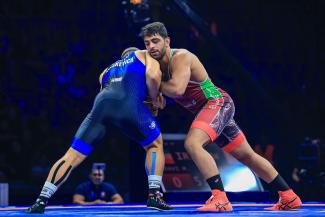Beach Wrestling World Series returns with 4-Stop Strong Season in All-New Locations in '21
Wednesday, June 2, 2021 - 13:45 By Katrin Strobl

After a successful launch in 2019, the World Series is back for a spectacular 2021 season with the best beach wrestlers taking to the sand between July and September.
22 months since the coronation of the 2019 kings and queens of the beach in Croatia, the Beach Wrestling World Series returns to appealing locations across Europe with more athletes and more nationalities than ever before. During the four events both women and men will take part in United World Wrestling’s fastest growing discipline and will define who is the best on the beach. Kicking off on the French Riviera in July, the reigning champions across all four weight categories will try and defend their titles until the Finale at Romania’s Black Sea in late September.
High flying action, frequent throws and a lot of athleticism will be on display throughout the season - the Beach Wrestling World Series and its recurring stars from four different weight categories will continue to earn the applause from spectators and gain international interest as the sport returns to the rings on the beach.
Four well-levelled weight categories, women and men on top of their sport and a cash prize - voted by fans for the ‘big move award’ are only some of the attractive aspects of this emerging discipline. With a three-rule and a three minute per fight format, the beach version of one of the world’s oldest sports appeals to a broader, younger and lifestyle-focused audience.
In 2021 the Beach Wrestling World Series begins in Saint Laurent du Var, which neighbours the city of Nice, on the French Riviera in mid-July. Landsberg Beach is the venue for the first clash of the beach wrestling elite after a forced 22-months hiatus.
Shifting focus during the summer from Olympic styles, the beach will be calling loud in September with three events in a row. On back-to-back weekends, the World Series will take an Italian turn and the first stop will be Rome, Italy and only a week later will head to the Aegean Sea in Katerini, Greece. While in both places the sport of wrestling can be traced back to ancient times, the modern approach of beach wrestling will be on display for the fans in the first two weeks of September.
For the season finale, traditionally held as the World Championships, the athletes will travel to the oldest continuously inhabited city in Romania, Constanta, on September 25 and 26. On the coast of the Black Sea, Mamaia Beach will serve as the crowning location of the 2021 Beach Wrestling World Champions.
The current title holders hail from Ukraine, Brazil, Greece, Georgia and Azerbaijan and carry the experience of Olympic Games and medals on their shoulders – who is ready to grapple for glory and achieve accolades in the wrestling’s freshest field, the Beach Wrestling World Series?
Beach Wrestling World Series 2021
16-17 July - Saint Laurent du Var (FRA) | Landsberg Beach
03-04 September - Rome (ITA) | Lido di Ostia
10-11 September - Katerini (GRE) | Paralia
25-26 September - Constanta (ROU) | Mamaia Beach
UWW Beach Wrestling
UWW, then known as FILA, codified the form of beach wrestling in 2004. Beach wrestling is standing wrestling done by wrestlers, male or female, inside a sand-filled circle measuring 7 meters (23 ft) in diameter. The style originally mirrored the rules used before the use of wrestling mats, and beach wrestling has been regarded as the oldest version of international competitive wrestling. The international rules have been modified in 2015 by UWW, with the current rules allowing wrestlers to score points via takedowns, pushing their opponent out of bounds, or bringing the opponent down to their back. The Beach Wrestling World Series was introduced in 2019 with the Beach Wrestling World Champions crowned during the final of a 4-legged competitive season across beach locations around the world.
Weight classes
Men: 70 kg, 80 kg, 90 kg, and +90kg
Women: 50 kg, 60 kg, 70 kg, and +70kg
Find out all about the Beach Wrestling World Series at www.beachwrestling.org
Follow us on social media
IG @uwwbeachwrestling
FB @ Beachwrestlingworldseries
YT @ https://www.youtube.com/channel/UCU82VJze6xdYhhp3uEFA_tw/featured - watch the competitions live


Share your thoughts.
Comments